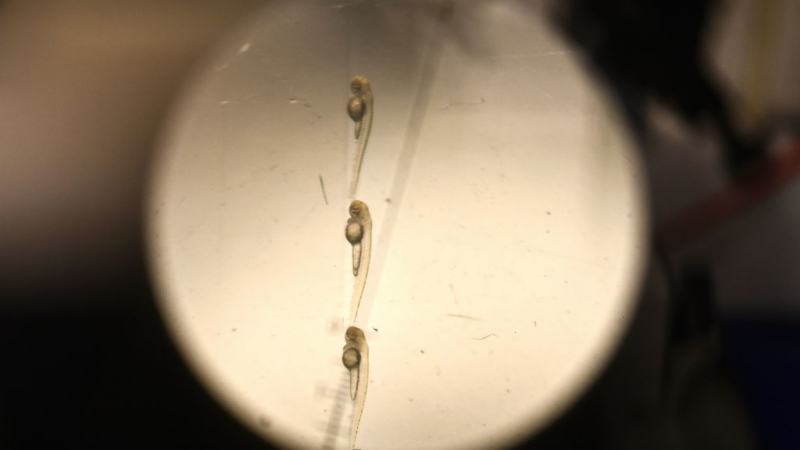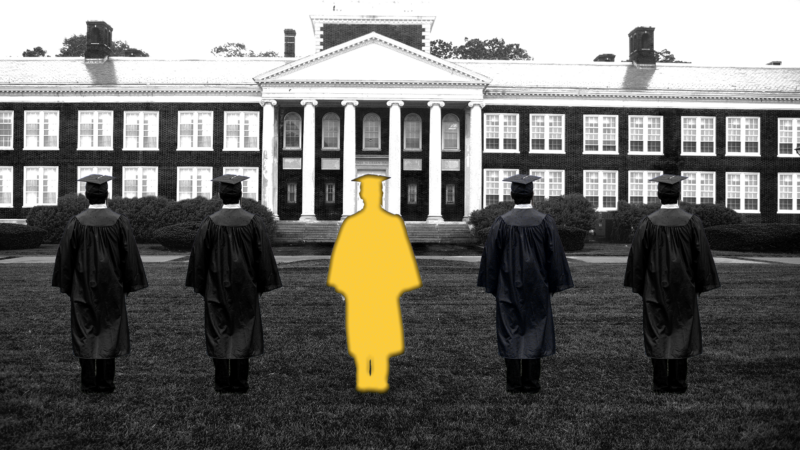Tiny fish on ketamine may show how drug eases depression
A single dose of the anesthetic ketamine can provide weeks of relief from severe depression.
One reason may be that the drug causes long-term changes to a brain circuit involved in “giving up,” a team reports in the journal Neuron.
The team found that in zebrafish, ketamine alters this circuit in a way that causes the fish to persevere in the face of adversity rather than becoming passive.
This resilience appears linked to brain cells called astrocytes, which play a central role in the “giving up” circuit.
“Something happens within those cells that changes their response” to adversity, says Misha Ahrens, an author of the study and a senior group leader at HHMI’s Janelia Research Campus. “We don’t know what that is yet.”
But if scientists can figure it out, they might be able to develop more effective versions of ketamine and other psychiatric drugs, Ahrens says.
Fish and futility
The research involved the larval zebrafish, which is smaller than a grain of rice and looks like a tadpole.
“It’s transparent, so you can basically see what’s going on in the entire brain all at once,” says Alex Chen of Harvard University, another member of the team.
For the experiment, the fish had to be kept stationary so scientists could monitor its brain.
“But we still want it to feel like it’s swimming through a virtual world,” Chen says.
The team did this by projecting images indicating forward movement when the animal swished its tail. Then they switched to images showing no progress, no matter what the fish did.
“The fish will swim harder at first and struggle more,” Chen says. But eventually, “it will just stop and sit there.”
This “giving-up” behavior is used to test antidepressant drugs in animals, especially mice. A promising drug will usually cause the animal to struggle longer before giving up.
Ketamine had this effect on zebrafish.
Astrocytes are key
Meanwhile, the researchers were using a high-powered microscope to monitor the activity of astrocytes.
These star-shaped brain cells support and communicate with neurons, the cells responsible for behavior and thinking. A subset of these cells also acts as a switch between active and passive behavior.
When a fish in the experiment saw that its efforts to swim were futile, the activity level of astrocytes in this switching circuit began to rise.
“And then once it reaches a threshold, the animal gives up, says Marc Duque, another team member from Harvard.
The team thought ketamine might immediately reduce the activity of astrocytes. But it did the opposite – at first.
“When we looked acutely at what ketamine does, we saw that ketamine actually activates these astrocytes in a way that nothing else does,” Duque says.
But that dramatic increase lasted for less than an hour, the time when the animal was immobilized by the anesthetic effect of ketamine.
After the drug wore off, the astrocytes returned to their normal level of activity and tended to stay there, even when a fish was struggling.
The team found that ketamine had a similar effect on the astrocytes in mouse brains.
The results suggest that long-term changes to these cells may be one reason that ketamine continues to relieve depression weeks after a dose.
The next step is to figure out precisely how ketamine is changing the inner workings of astrocytes to make them less responsive to stress, Ahrens says.
In the meantime, he says, researchers may want to use zebrafish to study how particular psychiatric drugs interact with the brain.
“Understanding the biology mechanistically is also important for drug discovery. If you know how it works, it’s much easier, for example, to make more effective variants of the drug.”
For example, versions of ketamine that treat depression without the mind-bending side effects.
‘Don’t be boring!’ How to cope with the social pressure to drink during Dry January
What do you say to people when they ask you why you aren't drinking? How do you get your friends to hang out in places other than bars? We tackle the social conundrums of sober socializing.
Winter illnesses return with a vengeance
The annual winter respiratory virus season is in full force. The number of people catching the flu is skyrocketing, while COVID-19, RSV and other respiratory viral illnesses are also rising.
A looming ‘demographic cliff’: Fewer college students and ultimately fewer graduates
The long-predicted downturn in the number of 18-year-olds is almost here. And it isn't just a problem for higher education. It's a looming crisis for the economy.
As winter storms strike, airlines scramble to de-ice planes and keep them flying
A pair of powerful major winter storms is disrupting the U.S. air travel system this week. That leaves airlines no choice but to de-ice their planes before takeoff to keep them in the air.
Bezos’ Blue Origin is nearing liftoff on the 1st flight of its newest, biggest rocket
New Glenn, developed by the private space firm founded by billionaire Jeff Bezos, is on the pad at Cape Canaveral, Fla., and could launch on its maiden flight as early as Friday.
What to know about the wildfires spreading through Southern California
Three wildfires are currently impacting Los Angeles and Ventura counties, prompting thousands of people to evacuate, schools to close and power lines to be shut off.






